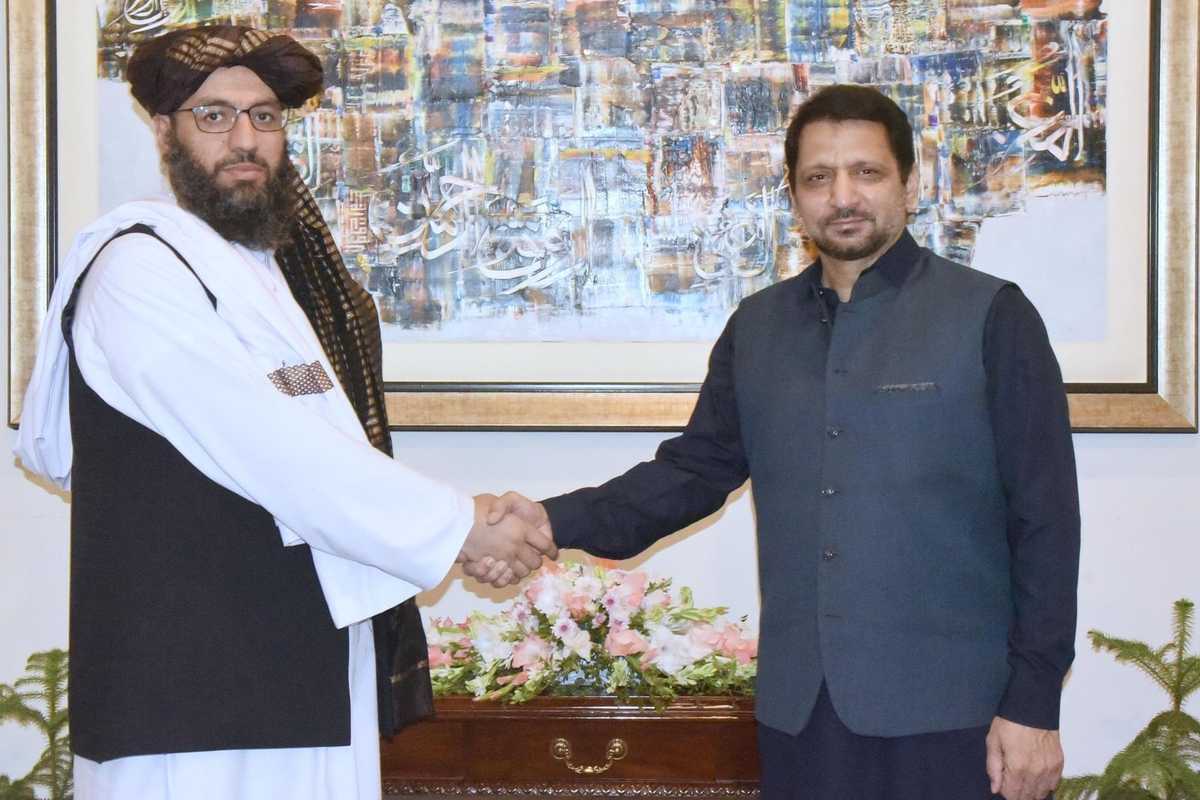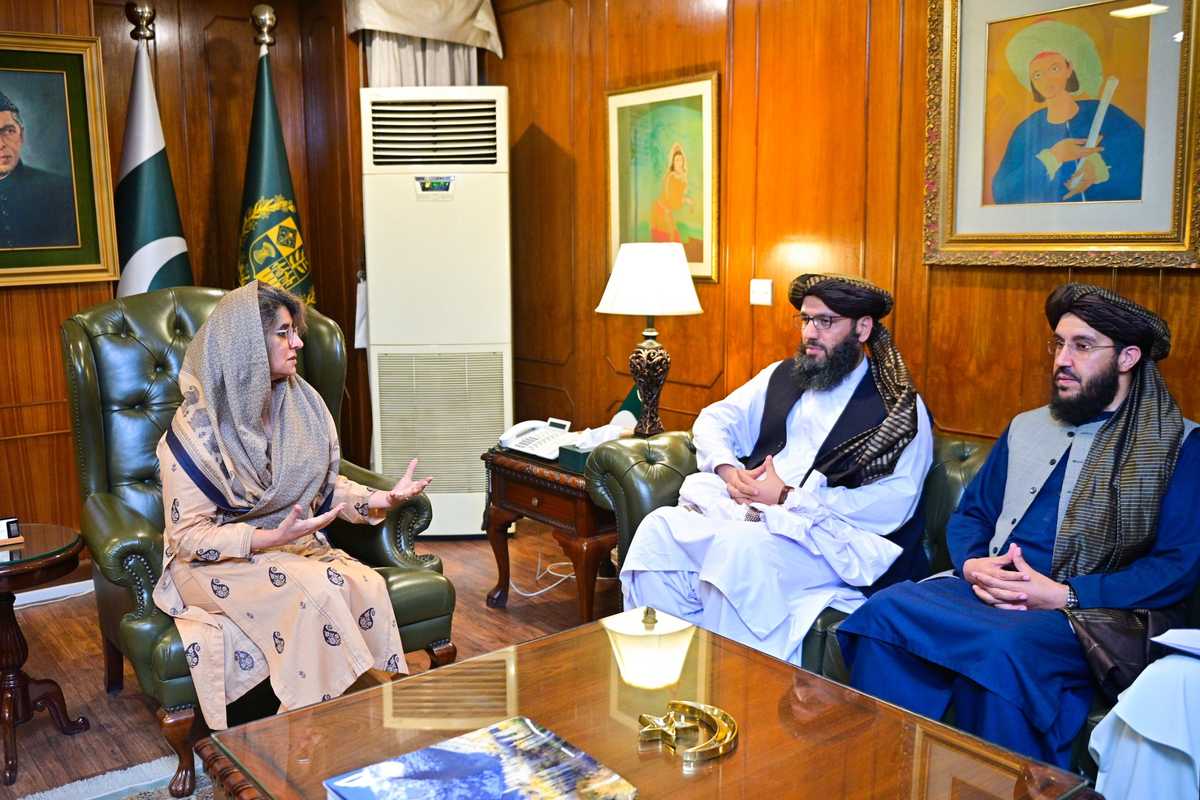Pakistan, Afghanistan conclude high-level talks on trade, terror, and regional stability
Talks in Islamabad focused on counterterrorism, with both sides agreeing that terrorism is a serious threat to regional peace

Aamir Abbasi
Editor, Islamabad
Aamir; a journalist with 15 years of experience, working in Newspaper, TV and Digital Media. Worked in Field, covered Big Legal Constitutional and Political Events in Pakistan since 2009 with Pakistan’s Top Media Organizations. Graduate of Quaid I Azam University Islamabad.

Ambassador Syed Ali Asad Gillani (R), Additional Secretary for Afghanistan and West Asia, with Mufti Noor Ahmad Noor (L), Director General of the First Political Division at Afghanistan’s Ministry of Foreign Affairs.
Courtesy: Ministry of Foreign Affairs
Pakistan and Afghanistan concluded the first round of Additional Secretary-Level Political Consultations in Islamabad on Monday, discussing a wide range of bilateral issues, including trade, counterterrorism, and regional connectivity.
The meeting followed Pakistan’s Deputy Prime Minister and Foreign Minister Ishaq Dar’s visit to Kabul in April 2025. Pakistan’s delegation was led by Ambassador Syed Ali Asad Gillani, Additional Secretary for Afghanistan and West Asia. The Afghan side was headed by Mufti Noor Ahmad Noor, Director General of the First Political Division at Afghanistan’s Ministry of Foreign Affairs.
The talks covered trade and transit cooperation, security, Afghan repatriation, and enhanced connectivity. Both sides agreed that terrorism poses a grave threat to regional peace. Pakistan called for “concrete actions” against terrorist groups operating from Afghan soil, warning that their presence undermines its national security and regional development.
On trade, officials reviewed progress on measures announced during Dar’s earlier Kabul visit. These include removing a 10% processing fee on Afghan goods, reducing inspection procedures, implementing an insurance guarantee, and operationalizing a cargo track-and-trace system.
Connectivity and infrastructure
Both sides emphasized the importance of enhanced regional connectivity. They reiterated their commitment to finalizing the Framework Agreement for the Uzbekistan-Afghanistan-Pakistan Railway, a strategic project aimed at improving regional transport links and boosting economic growth.
Discussions also addressed the repatriation of Afghan nationals. Pakistan noted it had issued over 500,000 visas to Afghans across various categories, medical, tourist, business, and study, since January 2024.
The two countries agreed to continue working together to ensure legal and documented cross-border movement.
After the talks, Mufti Noor Ahmad Noor called on Pakistan’s Foreign Secretary Amna Baloch. She emphasized the importance of regular diplomatic engagement to deepen bilateral relations, resolve mutual concerns, and contribute to peace and prosperity in the region.

Regional context and trilateral talks
The meeting follows a May 2025 informal trilateral meeting in Beijing, where Foreign Ministers of Pakistan, China, and Afghanistan agreed to expand cooperation under the Belt and Road Initiative (BRI) and extend the China-Pakistan Economic Corridor (CPEC) into Afghanistan.
During that summit, the three nations reaffirmed their commitment to regional security, development, and economic integration.
The Pakistani delegation included Foreign Minister Ishaq Dar, who held separate meetings with top Afghan Taliban officials in Kabul in April, including Prime Minister Mullah Muhammad Hassan Akhund and Deputy Prime Minister Mullah Abdul Salam Hanafi.
New mechanism
Tahir Khan, a senior journalist and expert on Pakistan-Afghanistan affairs, said the inaugural round of Additional Secretary-Level Talks marks the practical implementation of an agreement reached earlier this year to initiate a new bilateral consultation mechanism.
“This is important because both Pakistan and the Taliban government had agreed to launch a new format for political consultations, and now it has practically begun,” Khan told Nukta.
He explained that the mechanism was effectively initiated during Foreign Minister Ishaq Dar’s visit to Kabul. The Afghan side is also participating through its relevant political department, led by its Director General.
Khan noted that the timing of the talks is especially significant.
“Despite a recent surge in violence, both sides have chosen to move forward with dialogue. This shows that the ongoing violence has not derailed diplomatic engagement.”
He emphasized that the current talks reflect continuity in Pakistan’s efforts to strengthen ties with the Taliban-led administration.
“In the past, we saw agreements made but rarely implemented. The launch of this mechanism is proof that a new process of structured dialogue has now begun.”







Comments
See what people are discussing